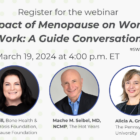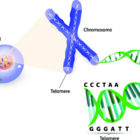Menopause always comes with challenges. When you are 50ish, the symptoms come on gradually.
But when you are younger and still have normal or relatively normal hormone levels, treatment causes an abrupt drop in those hormones, and that causes you to be catapulted into menopause. That large, sudden change in hormones causes large, sudden changes in how you feel.
This situation is called either medication-induced menopause, or if caused by surgery that removes both ovaries, surgical menopause. It’s a really significant side effect of treatment that can add a lot symptoms to an already challenging time.
Here are 5 common ways that treatment can cause early menopause.
- Removal of the ovaries to treat cancer (Survivors)
- Removal of the ovaries to prevent cancer (Previviors) such as women with the BRCA gene
- Removing the ovaries to treat ovarian cysts or other benign conditions like endometriosis
- Chemotherapy or radiation for treatment of breast cancer, uterine cancer or ovarian cancer — these treatments can damage or destroy the ovarian cells that produce hormones
- Hormonal treatments that turn off or block the ovary’s ability to make hormones

Hot Flashes are a common symptom of early menopause
Many women commonly as these 5 questions…
1. Is medically-induced menopause reversable?
If both ovaries are removed, that is permanent. But some chemotherapy or other medical treatments that stop the ovaries from working may reverse. Medications that just temporarily suppress the ovaries like GnRH agonists (an example is Lupron) will typically reverse when the medication is stopped.
2. Does early menopause affect your health?
It can. Early menopause comes with some additional health risks. There is a greater risk of heart disease, mood issues, bone loss leading to osteoporosis, and possibly an increased risk of dementia. Women who are able to take estrogen shortly after they enter early menopause will usually avoid most of these issues. The details are all outline in my best selling book The Estrogen Fix. If estrogen isn’t possible or desirable for you to take, there are many other options that can be use that are also outlined in The Estrogen Fix.
3. Will treatment-induced menopause affect fertility?
Another long-term side effect of early menopause caused by medical treatment is that it decreases fertility. If you are permanently in menopause, you cannot get pregnant naturally. Even if your menopause turns out to be temporary from treatments like chemotherapy, it often decreases fertility.
4. Are the menopause symptoms caused by medical treatment the same as those caused by natural menopause?
Yes they are. All menopause symptoms are caused by a drop or unbalance in hormones. If that occurs abruptly due to surgical removal of the ovaries, the symptoms are typically more severe. If you are near the mean age of natural menopause (age 51, range 46 to 55, in the United States), the symptoms are usually similar to natural menopause. These 7 symptoms are among most common:
a. Hot flashes
b. Irregular or absent periods
c. Anxiety, sadness or depression
d. Mood swings
e. Insomnia
f. Weight gain
g. Vaginal pain and vaginal dryness
5. What treatments options are available?
There are an amazing number of treatments for the symptoms of menopause. Which one you choose will always depend on three things: 1. who is treating you, 2. on the condition you are being treated for that led to early menopause, and 3. your personal preferences. Here is a brief overview and some things to consider:
a. Fertility Treatments: If you want to get pregnant after treatment, talk with your doctor before treatment starts about what you can do to preserve your fertility. This may include freezing your eggs if single, or freezing your fertilized eggs (embryos) if you have a partner. Other options include using a donor egg (getting an egg from another young woman) and then doing in vitro fertilization or gestational carrier (having another woman carry the fertilized egg to term).
b. Estrogen and Hormone Therapy (HRT): If you are being treated for a benign condition, most women are able to take estrogen safely. Details are explained in The Estrogen Fix. Remember that if you choose to take estrogen, it will address nearly all your symptoms because nearly all the cells of the body respond to it. If you choose other medications, they are more specific and you have to treat both the symptoms you’re aware of like hot flashes, and the ones that are silent like bone loss that can lead to osteoporosis.
c. Estrogen Alternatives: If you do not or cannot take estrogen, there are non-estrogen prescription medications, over-the-counter options (lubricants, supplements), complementary approaches (Cognitive Behavioral Therapy, Yoga, and Tai Chi), and lifestyle changes that include nutrition, exercise, stress reduction and sleep hygiene.
d. Emotional Support: All of this is very stressful for both the woman and her family and loved ones. Getting a trained mental health person for both support and treatment as needed, and a knowledgable menopause expert to deal with the symptoms will be extremely helpful.
If you do not have a menopause expert in your area and would like to work with me to get help, you can register at MenopauseCoaching.com. We can discuss ways that I may be able to provide menopause coaching for you.
Yours in good health,
Dr. Mache
Mache Seibel, MD
Author of The Estrogen Fix
DrMache.com




